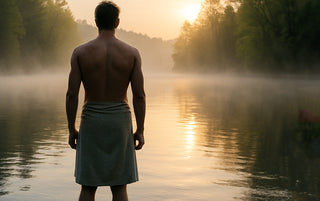A Personal Reflection on Conservation and Helping Wildlife
Living in Muskoka, I've had lots of opportunity to get up close and personal with the natural world. I love to spend time outdoors hiking or even just quietly sitting and taking in all the sights and sounds around me. By being out in the forest and on the lakes so often, I see a lot more wildlife than the average person, and lucky me, because I love animals! Sometimes I love them too much.
One early memory that has stuck with me is of an orphaned baby raccoon my older brother rescued when I was about four or five. Even though I was told not to handle it, I couldn’t resist carrying around the sweet furry bundle. All I wanted was to care for the poor little thing and make it feel safe and secure. Unfortunately, the baby became very stressed and sick, likely from over handling. Despite my good intentions, it was probably my fault that it didn't survive.

Even though I was just a small child, this was my first lesson in how, sometimes, doing less is more when it comes to wildlife.
That raccoon was the first of many times I've wanted to help distressed or injured animals over the years. Living in Muskoka, there are plenty of opportunities. These lessons are really personal to me, and often attached to memories that are devastating to my sensitive soul. Whether it was a raccoon, a squirrel, a turtle, a fox, a frog, a bird, or any other wild animal.......Most often when I stepped in, it didn't end well.
It seems like Nature doesn't really want my help.
Sometimes, intervening just makes the suffering of a sick or injured animal last longer. While we mean well, our actions can sometimes be more about making ourselves feel better than actually helping the animal. It may be hard to hear, but it's true. It’s tough to do nothing when we so badly want to help, but I think it’s really important to ask: “What does real help look like? Will what I’m about to do truly be the best thing for the animal, or is it more about soothing my own sad heart?”

Compassion can be a heavy burden...And it's really hard to watch any animal suffer.
I think it's important to do everything we can for species that are threatened or endangered to help ensure their survival as a species. But otherwise, it might sometimes be better to let nature run its course. The circle of life is a fundamental concept in ecology, and very often a sick or injured animal will also become an important meal for another animal.
This isn’t about being cold-hearted or uncaring. It’s about understanding and respecting the delicate balance of nature. Intervening in wildlife situations should be done with careful thought. If something can be done with minimal interference, ie. moving a turtle off of a roadway, I'm all for it! But if it involves taking an animal out of its habitat, or intervening in natural processes, I now personally think twice about it. It may sometimes be a good idea to contact a professional who can advise the best course of action to take (or not take) for the animal and the ecosystem.

It's complex topic that can involve heavy emotions, but often the best way forward is to step away and let nature do its thing; Sometimes doing nothing is the "right" thing. We can help to keep the natural balance and health of our ecosystems.....Which is what conservation is truly about.
For me, it's been a hard lesson and it sometimes makes my heart hurt. But my new perspective comes from a place of experience and greater understanding of our precious environment.









